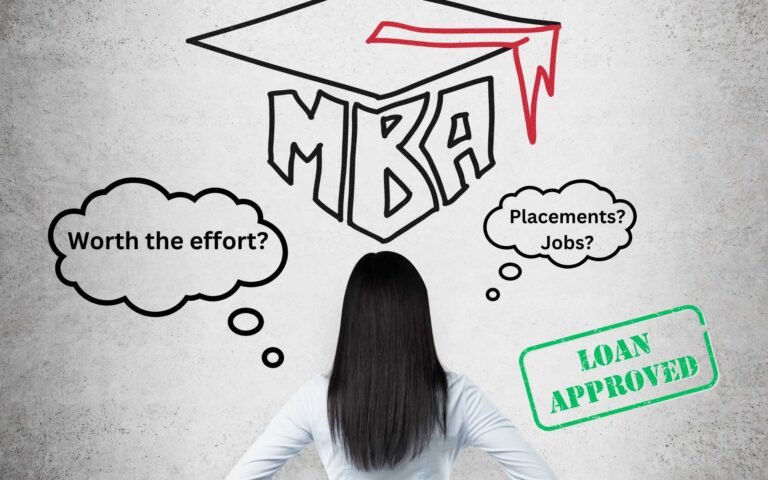There are several ways to finance your Executive MBA, starting from self-finance, education loans, personal loans, employer-sponsored MBA, or even crowd financing.
You will get the best ROI on a self-financed MBA, which will also give you the highest freedom. Sponsored MBA is also a decent option but comes with different terms to pay back your company. Loans have the least ROI but can be a good career starter.
In this article, we will explore each way of financing an MBA, along with the ROI associated with each method. I will also add my personal experience with my MBA and a few other bits that I have heard from different admissions consultants.
Self Financed MBA
This is perhaps the best way to do an executive MBA. With your own funds, you can easily fund an online MBA, or if you have the budget, you can go for a full-time MBA.
The best aspect of doing this MBA is that you do not owe any accountability to anyone regarding your course and also have the widest freedom to change your career. At the end of the MBA, you can also negotiate with your own boss for a higher salary, start your own consultancy like me, or perhaps explore the market for a better position.
However, you do have to bear the costs. With an online MBA, your typical costs will be around ₹1 lakh to ₹5 lakh, with most colleges charging on the lower side. Since you might already have decent work experience, your online MBA will only have a net positive impact on your career.
Financing Your MBA with Loans
Loans are an easy way to finance your MBAs as long as either it is an online MBA or the MBA college is a renowned one with very successful placement rates like the IIMs. Otherwise, financing full-time MBAs with your own funds is a very expensive affair.
Most offline MBAs cost around ₹25 lakhs for a two-year course or around ₹15 lakhs for an executive MBA. Financing those with loans is only a prudential choice as long as your current employment generates at least ₹1 lakh per month after all taxes and dues. Otherwise, these MBAs tend to be highly expensive, with EMIs starting from around ₹50,000 per month.
Education Loan
Education loans tend to be the usual go-to when aspirants think of pursuing an MBA. However, the loan rates of different institutions start from 14% per annum, which is around the same cost as a personal loan. Further, there are a lot of terms and conditions associated with education loans, and there are ample chances that your application will be rejected, leaving you with very little time to explore other financing options.
However, if you have secured admission to a highly reputed college, an education loan could be the right choice, given the high placement records that typically exist in such institutions.
Some education loans might also require you to provide some collateral, and in most cases, it is the house of the resident or their ancestral property. In this case, too, it gets highly risky. With economic uncertainties, global supply chain shocks, and impending situations of war all over the world, it gets extremely risky to take this path.
This is why taking an education loan is less advisable from my own experience.
Personal Loan
A personal loan is one of the most convenient ways to pay for an MBA if you have a decent income source. Even if you take a regular executive MBA, a personal loan in this economy will cost you around ₹15,000 per month in EMIs for a loan of approximately ₹10 lakhs, which is around the fees required by most offline regular executive MBAs.
If you can afford to pay this fee, it can be advisable to seek a personal loan.
However, do keep in mind that the higher your credit score you have, the lower tends to be your interest rate. This is why I advise people to get a low limit credit card so that it helps you build a credit score while stopping you from overspending.
Employer-Sponsored Executive MBA
An employer-sponsored MBA might seem like a dream come true for many working professionals. However, they are extremely rare and have attached terms and conditions that might not be suitable for many.
Employer-sponsored MBAs are typically granted to those professionals who play a key role in the company, have shown a high degree of loyalty to it, and where employers are confident that the returns will be a lot greater to them than the cost of an MBA.
To know whether your employer supports a sponsored executive MBA program, take a look at your company policy or contact your HR department.
Crowd Funding
This is an unconventional but viable way of doing your MBA.
If you think you could give a greater return to the world in exchange for your MBA, you can easily start a crowdfunding campaign on platforms like GoFundMe.
Try to be unique in presenting why your MBA would benefit the donors and how you wish to pay them back.
The Untold Secret of a Free Executive MBA
If you think that none of the abovementioned options would work in your case, you can still get an MBA for free. However, you won’t get a degree certificate, but you will get all the benefits and certificates for your knowledge. And from my own experience as a consultant, I can vouch for the fact that “no one checks your degree if you have the right knowledge.”
The Free MBA option is available and open to everyone. You just need to have finished your undergraduate courses like B.Tech, BBA, B.Com, BSc, or any other professional course.
There is a small consultancy fee of ₹5,000 to design the course as per your needs. The course is designed by experts who are MBAs themselves and have been working with several international brands and companies.
Contact us with the form provided at the Contact Us page for more details.




